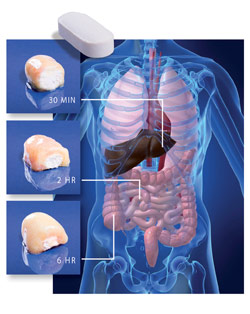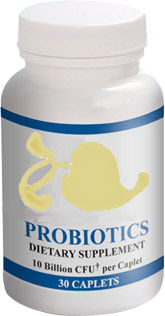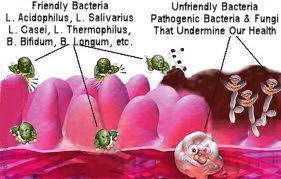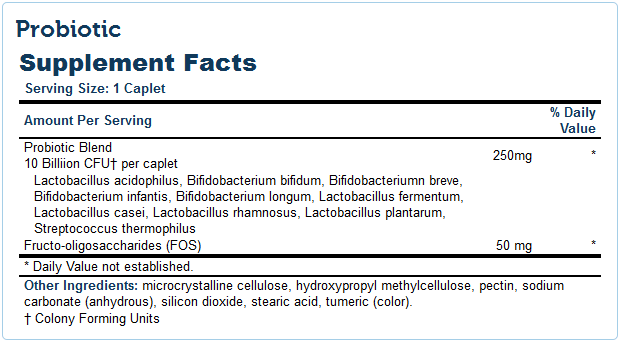
Featuring Probiotics
Key Strains of Probiotic Bacteria and Studies Regarding Their Potential Benefits to Human Health:
Proven Probiotic ReleaseMany probiotics on store shelves fail to provide live organism viability by the time they are consumed, with probiotic organisms dying on the shelf or in the consumer’s gut, and never providing any benefit to the consumer. Powders, liquids, capsules, even cultured dairy products offer no real protection, losing most of their sensitive, probiotic organisms during passage through the stomach’s harsh environment.
Our product is different. Over a decade of extensive research, development and testing of probiotic delivery forms has led to the patented, protected and timed- delivery process used in our Probiotic supplement. Rest assured that our Probiotic supplement has outstanding shelf-life, so that there is no need for refrigeration. Our independent third party tests prove it.
These above DAPI fluorochrome microphotographs document the population of probiotics within the lower intestinal tract over a typical 10-hour period of release, using our patented technology.
|
|
Probiotics(Experts Declare That You Need 4+ Pounds of These Friendly Bacteria Inside You!)
The Importance of External Sanitation - from a Historical PerspectiveHistorically, how a people take care of their sewage and garbage (which is a main source of pathogenic bacteria) is the single most important element in their overall physical health of a given population. Poor sanitation is what caused health plagues of the past. Internal Sanitation - the Final Frontier!
Pathogens Inside Us Are Far More Dangerous Than Those Outside Us
The above three things are called external sanitation because they take place outside our bodies. Internal sanitation, or the control of harmful microorganisms inside our bodies is a newer frontier in human health. We have three ways to help control/reduce bacteria inside the body. They are:
What Are Probiotics?Probiotics are beneficial, rather than harmful, bacteria. People in the past have typically eaten probiotics in the form of fermented foods such as kefir, yogurt, sauerkraut or kimchi. Today, it is possible to consume probiotics in supplement (pill) form.
We invite you to learn about the different species of probiotics in our Probiotic supplement — described in the left-hand column. The Benefits Obtained From ProbioticsAgain, the two most important things that probiotics do is to eat our wastes converting them into beneficial chemicals and, also, they “occupy” the space in the intestines, so that pathogenic bacteria and fungi have no space in which to implant. More specifically, all of the following benefits have been shown through one or more studies to result from consumption of probiotics:
What Are Adequate Amounts of Probiotics?Ensuring adequate amounts of probiotics is an important health habit. The single best way to ensure you have enough probiotics in you is to take enough probiotics each day that you don’t have intestinal gas. If your intestines are “speaking” to you, they are saying, “Probiotics, please!” Why Do You Need to Keep Consuming Probiotics?Friendly bacteria are easily killed by many things, including:
Most people either have dental metals in their mouth, or drink and bathe in chlorinated water, or are full of pesticides, etc. Therefore, most people need to almost continuously consume probiotics in order to maintain the four pounds of probiotics in your body that you need to stay optimally healthy. Cleansing Enzymes and Seven Essentials will help you maintain your probiotics, but periodically, your body could use the extra help of our Probiotic supplement. Our probiotic supplement utilizes BIO-tract® delivery technology that not only protects probiotic organisms from stomach acid on their way to the intestinal tract, but also optimizes the release into the gut of probiotics organisms and probiotic growth accelerating Fructo-oligosaccharides.
Cited Probiotic Research and Further Probiotic Study References: |
|
||||||||||||||||||||||||||||||||||||||||||||||||||||||||
Copyright 2008-2016 Healthy-Living.Org. All rights reserved.
These statements have not been evaluated by the Food and Drug Administration. No product mentioned herein is intended to diagnose, treat, cure or prevent any disease. If you are pregnant, nursing, taking medication, or have a medical condition, consult your physician before using this product.
The information on this website is intended as a sharing of knowledge and information from the research and experience of the Healthy-
Living.Org staff and contributors. It is not intended to replace a one-on-one relationship with a qualified health care professional and
it is not intended as medical advice. You should not use the information on this site for diagnosis or treatment of any health
problem or for modification of any medication regimen. You should consult with a healthcare professional before starting
any diet, exercise or supplementation program, before starting or discontinuing any medication, or if you suspect
you have a health problem. You should keep in mind that cited references to ongoing nutritional scientific
study are most likely not accepted by the FDA as conclusive. These references and mentions
of potential benefits are disavowed as product claims and are only included for educational
value and as starting points for your own research. No food or supplement can be
considered safe for all individuals. What may benefit 999,999 of a million people
may harm you. Therefore, no one can take responsibility for your health
except you in consult with your trusted health professional.


 Many wellness experts teach that the
Many wellness experts teach that the  Scientists today are beginning to focus on internal sanitation. This is one of the great new frontiers of health. The most important issue about intestinal sanitation is to make sure that you have a minimum ratio of friendly bacteria to harmful bacteria of at least 80% friendly bacteria to 20% harmful bacteria. Unfortunately, in many people this ratio is reversed, with the result that large amounts of harmful chemicals produced by pathogens are constantly entering the blood stream and toxifying the body.
Scientists today are beginning to focus on internal sanitation. This is one of the great new frontiers of health. The most important issue about intestinal sanitation is to make sure that you have a minimum ratio of friendly bacteria to harmful bacteria of at least 80% friendly bacteria to 20% harmful bacteria. Unfortunately, in many people this ratio is reversed, with the result that large amounts of harmful chemicals produced by pathogens are constantly entering the blood stream and toxifying the body. Bacterial infections once emptied European cities. Factually, pathogenic bacteria have caused more human deaths and suffering than all other causes of death combined. What ended the plagues of the past and what keeps those plagues from returning now is public or external sanitation. Sanitation is simply the control/reduction of harmful microorganisms in our living areas, and it consists of the following:
Bacterial infections once emptied European cities. Factually, pathogenic bacteria have caused more human deaths and suffering than all other causes of death combined. What ended the plagues of the past and what keeps those plagues from returning now is public or external sanitation. Sanitation is simply the control/reduction of harmful microorganisms in our living areas, and it consists of the following: